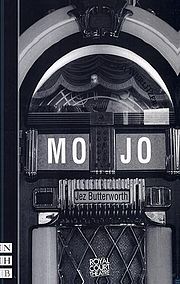- Mojo (play & film)
-
Mojo 
Written by Jez Butterworth Date premiered 14 July 1995 Place premiered Jerwood Theatre Downstairs, Royal Court Theatre
LondonOriginal language English Genre Comedy IOBDB profile Mojo is a 1995 play (then subsequent 1997 feature film) written by English playwright Jez Butterworth that premiered at the Royal Court Theatre in London, directed by Ian Rickson.
It is a black comedy set in Soho, a fast-paced gangster plot that tells the story of this particular night club's culture. Would-be rock 'n' roll star 'Silver Johnny' is on the road to fame and fortune during the summer of 1958, but encounters problems with his jealous manager, Ezra, the owner of the Atlantic Club, who is hell-bent on protecting him from the amorous advances of creepy local gangster/entrepreneur Sam Ross. Skinny, a member of Johnny's group, and one of the club's pill-popping employees, discovers Ezra sawn in half in separate dustbins, and Ezra's ambitious associate Mickey announces that Ross intends to take over the Atlantic Club.
Contents
Plot
Set entirely within the seedy Atlantic club, Silver Johnny - a young and talented performer on the road to fame and fortune - is held back by his jealous and protective manager Ezra, owner of the nightclub and father to a psychotic unloved son, Baby. As Silver Johnny progresses up the ladder to stardom, local gangster/entrepreneur Sam Ross begins to take an interest, and the only way to remove opposition (Ezra) appears to be sawing him in half, kidnapping Silver Johnny and leaving the club's fate in a state of limbo.
Ezra is discovered the next morning by his second-in-command, the highly ambitious Mickey, who announces that Ross intends to take over the Atlantic Club, setting the stage for a major power struggle; "He's been fucking cut in half. He's in two bins..."
Terrified by the potential threat of extermination by Ross and his gang, associates of the now deceased Ezra, (Potts, Sweets, Skinny and Baby) begin to lose their nerve, and try to convince themselves it's Mickey's idea of a joke; "It's Mickey's joke, it's Mickey's morning joke!" When this turns out to be false, the Atlantic Club gang prepare for what could be their final night. With just an ancient cutlass and an old Derringer as defence, the group starts to argue amongst themselves and even considers joining Ross, or simply leaving.
As the day wears on, people begin to gather outside the club waiting for the doors to open, oblivious to the situation. Sweating it out inside, the small group of four have to break the tragic news of Ezra's grisly death to Baby, who takes the news in a dreamlike, distant manner. Uneasy about Baby's mental stability, the Atlantic gang begins to become restless - especially about their catering. Arguments break out over frivolous matters (Uncle Tommy), and the group finally settles to consider just what its rivals are doing at that very moment.
In the climax to the fast-paced story, Sweets checks downstairs to see if the coast in clear for the gang to have a little space, rather than being cooped up in a single room, and finds Silver Johnny hanging from the ceiling. In sheer panic, Sweets calls for help, and is joined by the others. Baby reveals that by saving Silver Johnny he killed Mr Ross and discovered that Micky had betrayed them all for a share in the business. Skinny arrives and insults Baby, who responds by shooting him in the head with the Derringer. Mickey, Potts and Sweets attempt to cover the wound and to calm Skinny down, while Baby wanders around aimlessly. Silver Johnny is lowered to the floor and, tragically, Skinny dies. Unable to save Skinny's life, Mickey's authority and status break down, and he kneels beside his friend's body.
Film version
In 1997 a film adaptation was released of the stage play. It was also written and directed by Butterworth.
References
Further reading
- Butterworth, Jez (1995). Mojo (First ed.). London: Nick Hern Books. ISBN 1854592785.
External links
- Mojo at the Internet off-Broadway Database
- Mojo at the Internet Movie Database
Laurence Olivier Award for Best New Comedy (1976–2000) Donkeys' Years (1976) · Privates on Parade (1977) · Filumena (1978) · Middle-Age Spread (1979) · Educating Rita (1980) · Steaming (1981) · Noises Off (1982) · Daisy Pulls It Off (1983) · Up 'n' Under (1984) · A Chorus of Disapproval (1985) · When We Are Married (1986) · Three Men on a Horse (1987) · Shirley Valentine (1988) · Single Spies (1990) · Out of Order (1991) · La Bête (1992) · The Rise and Fall of Little Voice (1993) · Hysteria (1994) · My Night with Reg (1995) · Mojo (1996) · 'Art' (1997) · Popcorn (1998) · Cleo, Camping, Emmanuelle and Dick (1999) · The Memory of Water (2000)
Complete list · (1976–2000) · (2001–2025) 
This article on a play is a stub. You can help Wikipedia by expanding it.
